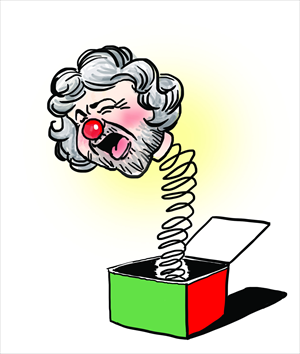Comedian’s electoral shock not so funny for Italy as parliament divided

Italy has emerged from the last vote with an entirely new political scenario.
The traditional left-right division was broken by the extraordinary result for the Five Star Movement, the protest movement led by comedian Beppe Grillo, which won a quarter of the vote.
Italy's lower house of parliament will have a secure left-wing majority, thanks to a law that gives the winning coalition extra seats despite a difference of only about 0.4 percent in the vote.
A completely different situation appears in the upper house of the Italian parliament, where due to a very complex counting system, Silvio Berlusconi's right-wing party has a relative, though not an absolute, majority of the seats.
With this outcome, a stable government is unrealistic. This political uncertainty has been received with concern by the EU and by the markets.
Instability is something that scares international investors, especially when it happens in the third largest European economy, in a time of economic crisis and after 14 years when Italian economic growth has been close to 0 percent.
The main element emerging from the Italian vote is the will of the electors to punish traditional parties blamed for the crisis.
Incumbent Prime Minister Mario Monti, who could count on some 70 percent of consensus support when nominated as prime minister over a year ago, scored less than 10 percent in the elections, a clear sign that Italians did not approve his austerity measures.
While Pier Luigi Bersani's left-wing coalition obtained a relative majority and will likely be called to form a government, it can be hardly considered the real winner of this election, having failed to give a credible alternative to Monti or Berlusconi's proposals.
One of the main surprises of the electoral results is Berlusconi's revival, or at least his limited loss. Most of the analysts were sure of his defeat but, also thanks to some unrealistic but highly popular last-minute electoral promises, he managed to stand his ground and gain just a handful of votes less than the Democratic Party.
But the real winner is Grillo and his Five Star Movement. With his very aggressive campaign against Europe, "old" politics, corruption and austerity measures, Grillo managed to talk to the hearts and bellies of the people and gain around 25 percent of the votes.
The agenda of the Five Star Movement includes a demand for a more direct democracy and a strong request for a different and more ecologically orientated approach to the economy.
Grillo and his movement have been accused of extreme populism and anti-democratic methods. Those within the movement who dared to dissent from Grillo's opinions have been expelled without the chance of debate.
Another controversial aspect of their campaign has been the opening to the extreme right movement CasaPound and the verbal violence used by Grillo in his speeches attacking his opponents.
With the international community calling for a quick solution of this crisis, there are two main scenarios being discussed by the media and the political leaders.
The first would be a large coalition government that would include Berlusconi's bloc, a possibility ruled out by Bersani in his post vote press conference.
While this option may help reassuring the markets and the European governments, it will not solve the endemic problems that have led to the surprising victories for the protest movement.
Such a government would probably not last for long as the political viewpoints within the coalition would be extremely diverse, strengthening the feelings that brought Grillo success.
An agreement with the Five Star Movement seems unlikely after their declared intention not to cooperate with any political party. Nevertheless, some parts of the left-wing coalition are already opening up to Grillo to discuss single proposals.
Another option would be to call for new elections. This would bring further instability and, if done with the same electoral law, not necessarily a better result. Italy fears becoming another Greece, but the options on the table are limited.
The author is a freelance journalist based in Bari, Italy. lovecchio.mauro@gmail.com